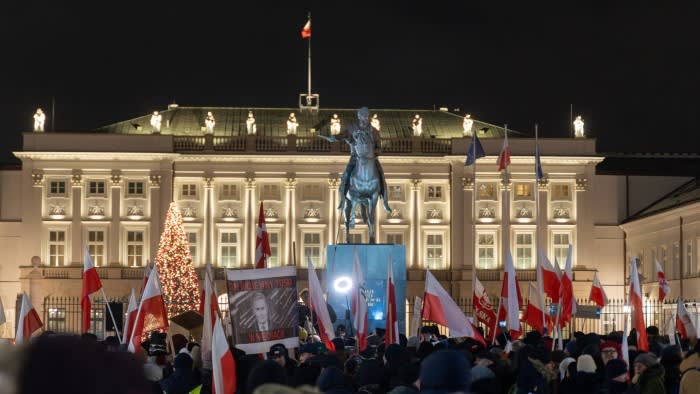Unlock the Editor’s Digest for free
Roula Khalaf, Editor of the FT, selects her favourite stories in this weekly newsletter.
Donald Tusk on Thursday faces his biggest street protest since becoming Poland’s premier, with longtime rival Jarosław Kaczyński leading demonstrations in Warsaw amid a deepening constitutional crisis.
Weeks of mounting tensions between Tusk’s new government and the outgoing Law and Justice (PiS) party came to a boil on Wednesday after two former ministers were taken to jail by police from the presidential palace.
President Andrzej Duda raised the stakes by siding with the opposition PiS lawmakers, who had been convicted for abusing power, and vowing to fight for their release as victims of political persecution. After entering prison, the two went on hunger strike on Wednesday.
Piotr Buras, of the European Council on Foreign Relations think-tank, said Duda’s goal was to raise tensions before the planned march on Thursday. “The talk about political prisoners . . . aims at creating a crisis situation which would weaken the government and be exploited by PiS,” he said.
PiS leader Kaczyński, Tusk’s political nemesis for more than two decades, is set to lead the protest and has urged supporters to rally because the premier “is putting the Polish constitution under threat”. PiS organisers have hired buses to bring more participants from other places to Warsaw.
Since taking power a month ago, Tusk has struggled to deliver on his campaign promise of pruning state institutions of PiS appointees and restoring the independence of the judiciary in order to unlock billions of euros in EU funding.
He has instead faced a fierce PiS backlash, including legal challenges and appeals to a constitutional court packed with judges appointed by the former government. The detention of the two lawmakers has added a new strand to the dispute.
“For the first time since the dark days of totalitarian rule, we have political prisoners in Poland,” former PiS prime minister Mateusz Morawiecki said on Wednesday.
The two lawmakers were sentenced to prison last month and were subsequently kicked out of parliament by the new Speaker, Szymon Hołownia. But Duda insisted on Wednesday that their arrests breached the constitution because he had granted a presidential pardon to the two MPs in 2015, at an earlier stage in their long court case over agricultural land deals.

To stop Tusk, PiS is relying on more than 2,000 judges it had appointed to different tribunals while in government. But the priority for PiS is the constitutional court, which on Thursday sided with central bank governor Adam Glapiński and said he should not stand trial before a state tribunal in a separate dispute with Tusk. The constitutional court will also review this month a separate PiS appeal to unwind his reform of state broadcaster TVP.
Amid heightened tensions, Thursday’s PiS protest will be “a major test for both the new government, as any type of law enforcement provocation will be met by narratives of political victimhood by PiS, and for the new opposition to gauge voters’ mobilisation and turnout”, said Michał Waszek, a director at CEC, a Polish public affairs company.
Duda is raising the stakes for Tusk, who must work alongside him until the next presidential election in 2025, when Duda will complete his second and final term. The president, himself a PiS nominee, first delayed Tusk’s appointment and then used his veto powers to block a budget bill that was tied to overhaul TVP. Duda described the TVP reform as causing “anarchy”. Tusk has long maintained that the broadcaster was spreading PiS propaganda.
Tusk’s comeback in October elections was welcomed as a beacon of hope by other politicians who defend the EU and its values. His success at the ballot box stood in contrast with recent wins by Eurosceptic and far-right parties in Slovakia and the Netherlands, respectively.
When Tusk visited Brussels last month, European Commission president Ursula von der Leyen told him to “rest assured that the commission stands by your side”.
But von der Leyen is under pressure to show that the Polish government is taking steps to restore the independence of the judiciary before releasing the country’s frozen funds — a challenging prospect given Duda’s veto powers.
PiS has seized upon this Catch-22 situation to insist that Brussels should be strict with Tusk and not allow him to override Polish legislation to fast track his reforms.
“The biggest challenge for Tusk is how to fix the rule of law without violating the law himself and I think that this is also a challenge for the European Commission,” said Piotr Bogdanowicz, a professor of EU law at Warsaw university.
The EU’s justice commissioner Didier Reynders is set to visit Warsaw next week to start negotiations over how to unlock more of the EU funds, after Tusk secured last month the release of €5bn. “We need something that doesn’t require presidential approval but that is as binding as possible,” said one EU official.

Emily Foster is a globe-trotting journalist based in the UK. Her articles offer readers a global perspective on international events, exploring complex geopolitical issues and providing a nuanced view of the world’s most pressing challenges.








